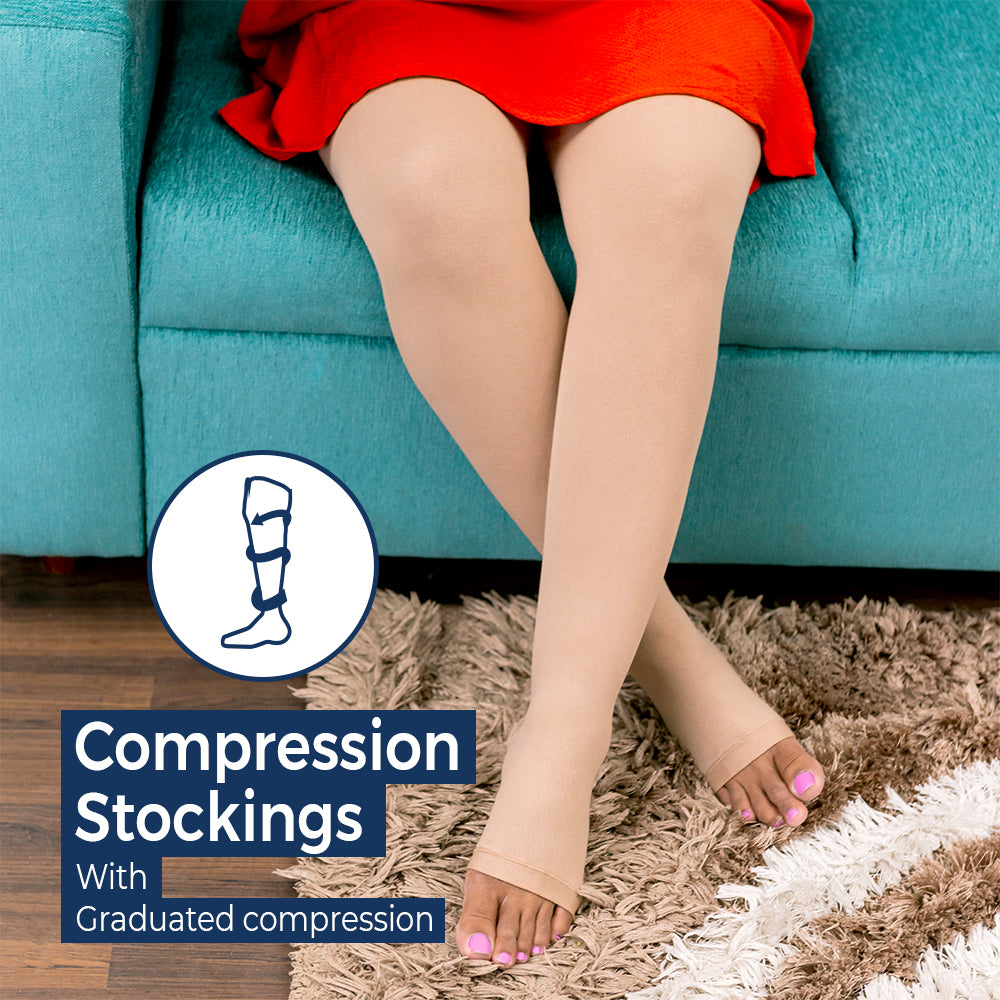When you are pregnant, there are many things to worry about — from what you are eating to how active you should be. However, one question that may not cross your mind is whether or not to wear compression hoses or stockings. Compression socks and stockings can help improve blood flow in your legs, which can be especially important during pregnancy. So when should you start wearing them? Read on to find out!
1. What are compression hoses or stockings, and what do they do for pregnant women?
Pregnancy is linked with many physiological changes that can lead to an increased risk of lymphedema and venous insufficiency. During the pregnancy period, the blood volume in the body increases, the uterus grows and puts pressure on the pelvis, and the hormone levels change. All of these factors can contribute to a build-up of fluid in the tissues and an increase in the size of the veins. This can lead to venous insufficiency when the veins cannot effectively pump blood back to the heart.
It is treated, venous insufficiency can lead to lymphedema, a condition where fluid accumulates in the tissues and causes swelling. Although there is no definitive cure for lymphedema, early diagnosis and treatment are vital to helping reduce the risk of complications. Pregnancy is just one of several factors that can contribute to lymphedema and venous insufficiency. Still, it is essential to be aware of the risks so that you can seek medical help if necessary.
Compression socks or stockings are a garment worn around the leg to apply gentle pressure. This pressure helps to promote circulation and can be used to relieve symptoms of conditions such as lymphedema and venous insufficiency. Compression socks for pregnancy are typically made from a stretchy material, such as elastic, and are available in various sizes.
They are usually very easy to put on and take off and can be worn during everyday activities. In addition, they can be easily hidden underneath clothing. Compression hoses are a convenient and effective way to manage chronic leg conditions.
For many pregnant women, swollen feet and ankles are a common occurrence. While mild swelling is often nothing to worry about, severe swelling can signify a serious condition called preeclampsia.
Preeclampsia is an ailment that can occur during pregnancy and is characterized by high blood pressure and protein in the urine. Preeclampsia can lead to serious health complications for both the mother and baby if left untreated. One way to help reduce swelling and lower the risk of preeclampsia is to wear compression stockings. These special stockings apply gentle pressure to the legs and help to promote circulation. Medical Compression stockings can help ease discomfort and prevent serious health problems by reducing swelling.
2. When should pregnant women start wearing compression hoses or stockings, and how often should they wear them?
To help manage these swelling of feet and venous insufficiency symptoms, many doctors at a specific time recommend wearing compression hoses or stockings. These garments help to support the legs and improve blood circulation. They are typically worn during the day and removed before going to bed. Some women need to wear them all the time, while others only need to wear them when they feel particularly tired or swollen. maternity support stockings and stockings should be comfortable but snug and replaced every 6-12 months. Talk to your doctor about whether wearing compression hoses or stockings is right for you.
3. How can pregnant women ensure they get the most out of their compression hose or stocking experience?
Maternity compression stockings and hoses are often recommended for pregnant women, as they can help to improve circulation and reduce swelling. However, it is essential to ensure they are worn correctly to get the most out of them.
The foremost step is to choose the right size. It is essential that the hose or stocking is not too tight, as this can constrict blood flow and cause discomfort. Once the correct size has been chosen, the next step is to put them on in the morning before swelling has a chance to build up. Finally, taking them off at night is important so your skin can breathe. With some care, compression hose and stockings can be a comfortable and practical way to support your pregnancy.
4. What are the different sizes for compression stockings?
There are various sizes and styles of medical compression stockings, so it is essential to find the right fit for you. The cost of compression stockings can vary depending on the brand, but they are generally affordable. There are several ways to get compression stockings, such as through insurance or purchasing them yourself. Regardless of how you get them, compression stockings can help to keep you comfortable during pregnancy.
5. From where to buy the best pregnancy compression socks?
Sorgen is the best place to buy maternity compression stockings. They offer high-quality maternity compression stockings at an affordable price. They also have a wide range of sizes to choose from, so you can find the perfect fit for your feet. www.Sorgen.co also offers to ship on all orders, so you can save even more money on your purchase. When you shop at www.Sorgen.Co, you can be confident that you are getting the best possible value for your money.
Conclusion
We hope you have found this article helpful in your search for the best compression socks for pregnancy. At Sorgen, we are committed to helping our customers make informed decisions about their health and wellness. If you have any questions or need additional information, please do not hesitate to contact us. Our expert staff is happy to help! In the meantime, check our website for more information on our products, including maternity compression stockings and support hoses for pregnant women. Thanks for reading!


